Key takeaways
- Hegel’s dialectics emphasizes understanding change through contradictions and embracing conflict as a transformative force.
- Key principles include viewing contradictions as opportunities for growth and recognizing that synthesis arises from the interplay of opposing ideas.
- Applying dialectics in education fosters deeper inquiry, as students learn to hold conflicting viewpoints, enhancing curiosity and philosophical growth.
- Challenges in dialectical thinking include resisting the urge for quick resolutions and balancing openness with critical judgment, requiring patience and self-awareness.
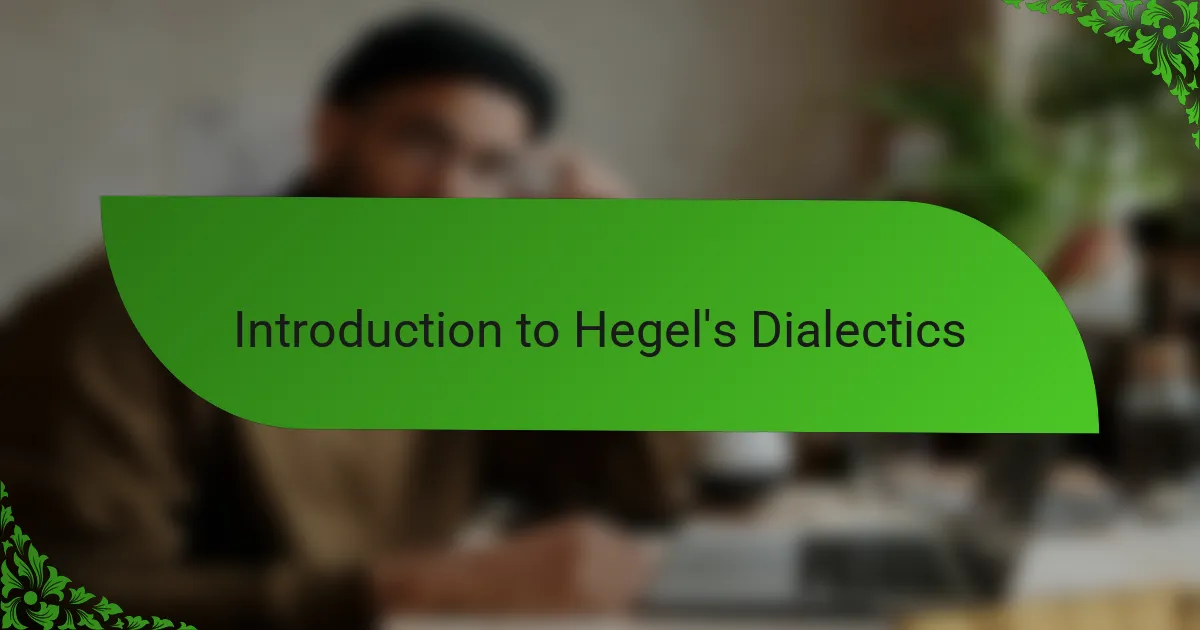
Introduction to Hegel’s Dialectics
Hegel’s dialectics, at its core, is a method of understanding change and development through contradictions. I’ve always found it fascinating how he proposed that progress happens not by avoiding conflict but by embracing it as a driving force.
Have you ever noticed how ideas or situations often seem stuck until opposing forces clash and a new perspective emerges? That’s exactly the essence of dialectics—it channels tension into something transformative rather than destructive.
When I first encountered Hegel’s dialectics, it felt like discovering a new language for thinking. It helped me see not just static facts, but dynamic processes unfolding, which has profoundly influenced how I approach problems and conversations.
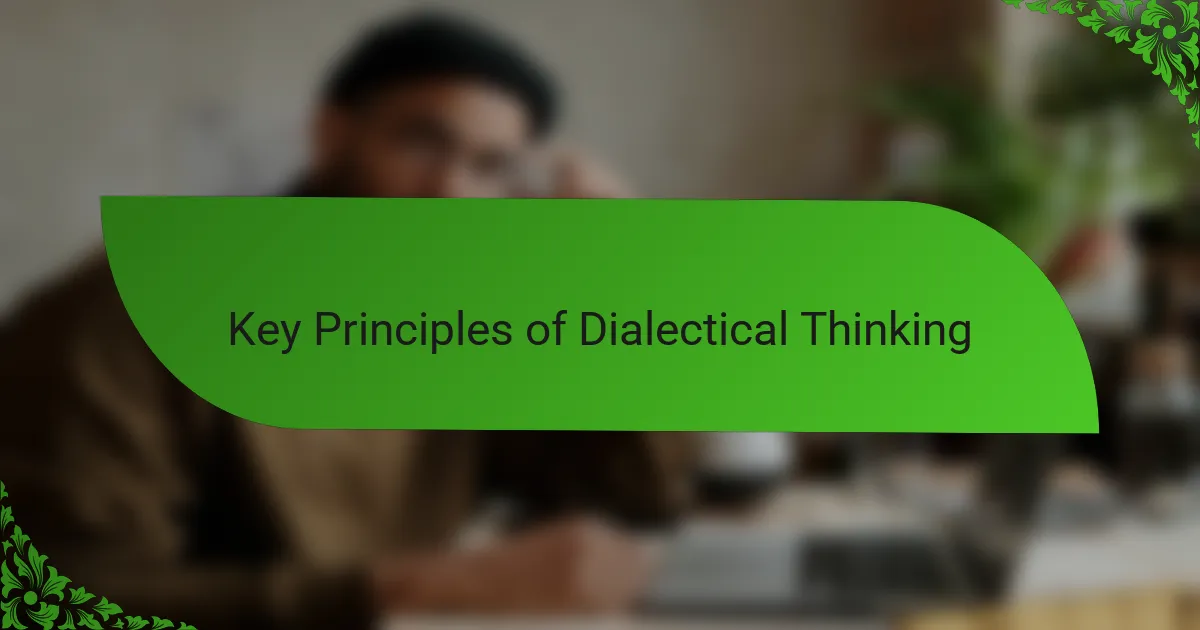
Key Principles of Dialectical Thinking
One key principle I found essential is the idea that every concept or situation contains its opposite within it—what Hegel calls the “thesis” and “antithesis.” This interplay isn’t just conflict for conflict’s sake; it’s a creative tension pushing toward a new understanding, the “synthesis.” Have you ever experienced an argument where both sides felt right, yet coming together revealed something deeper? That’s dialectical thinking at work.
Another thing I learned is that contradictions aren’t flaws but opportunities. Instead of seeing opposing ideas as dead ends, dialectics invites us to hold them together and explore their relationship. This approach shifts how I view problems—not as obstacles but as dynamic processes ripe for growth.
Lastly, dialectical thinking is fundamentally about change. It teaches us to expect transformation rather than permanence, reminding me to stay flexible in my thoughts and beliefs. Doesn’t life feel more alive when you see it unfolding in constant motion rather than frozen in place? That ongoing process of becoming is what dialectics captures so powerfully.
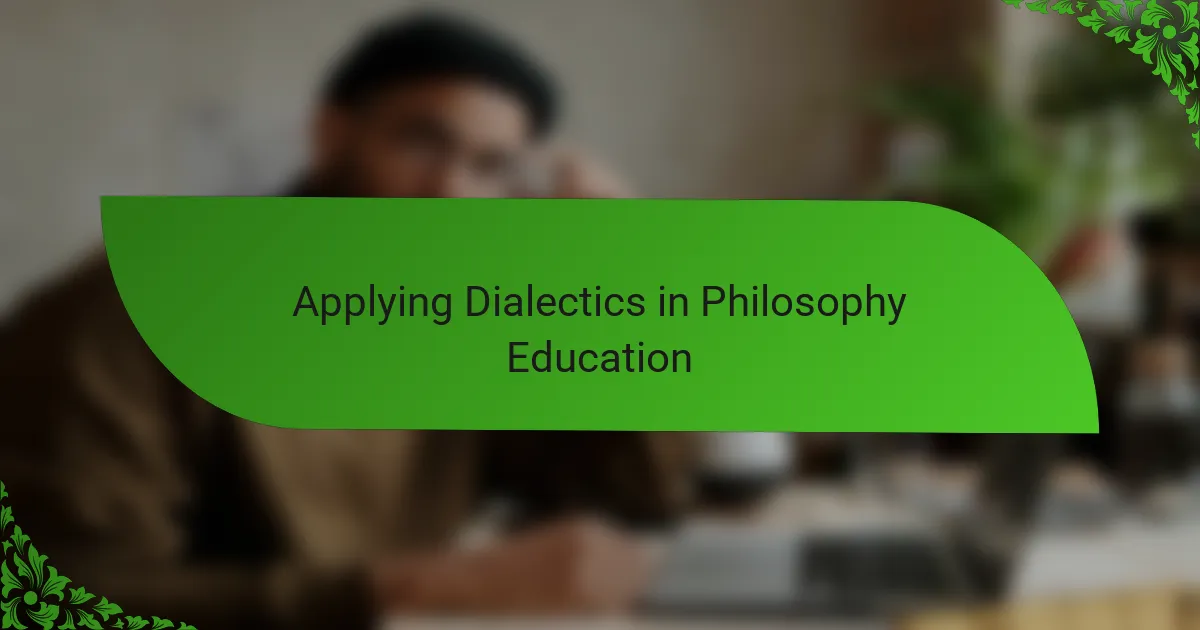
Applying Dialectics in Philosophy Education
When I began applying dialectics in philosophy education, I noticed how it transformed classroom discussions. Instead of aiming for quick answers, we learned to sit with contradictions and question them deeply. Have you ever felt the frustration of unresolved debates? That tension, I found, is where real learning sparks.
Using dialectics also made me rethink how students engage with philosophical texts. Rather than seeing ideas as fixed doctrines, we explored how every concept contained its opposite, encouraging students to embrace complexity. This shift helped them become more curious and less afraid of uncertainty, which is vital for philosophical growth.
What surprised me the most was watching students develop their own syntheses from conflicting viewpoints. It’s a slow, sometimes messy process, but witnessing that creative emergence gave me a profound sense of fulfillment. Isn’t that what education should foster—a space where new thoughts are born through dialogue and struggle?
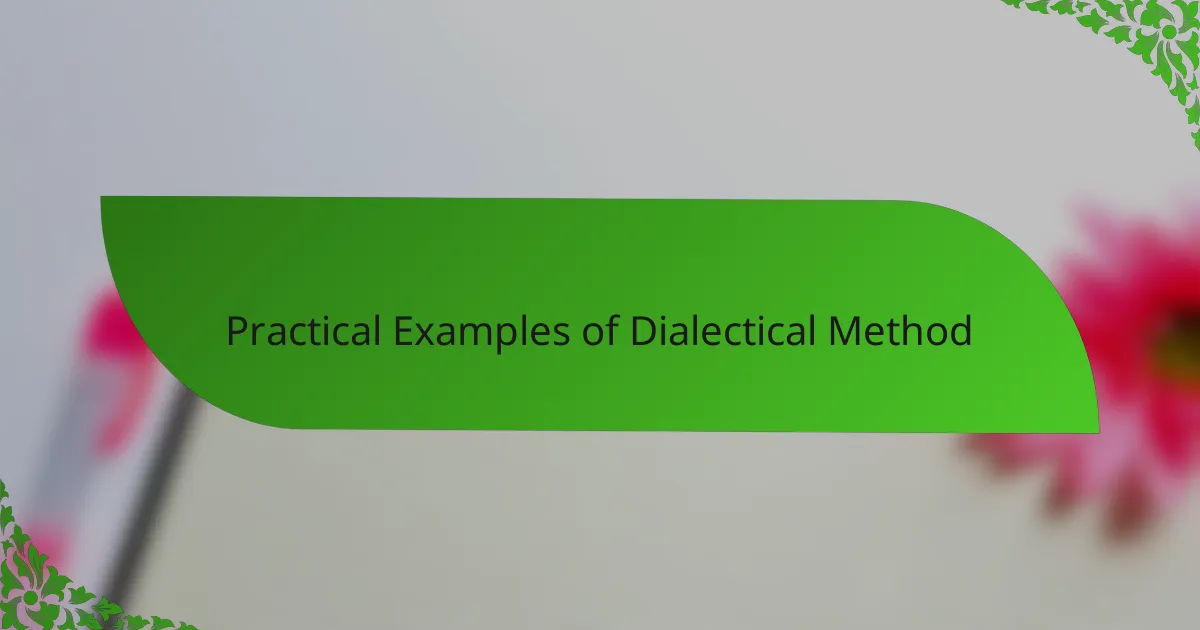
Practical Examples of Dialectical Method
One practical example of applying Hegel’s dialectical method occurred during a team project where conflicting ideas about direction created tension. Instead of pushing one viewpoint, I encouraged everyone to voice their contradictions openly. Surprisingly, this clash didn’t stall us; it sparked new insights neither side had initially considered.
I also remember using dialectics when facing personal decisions, like choosing between career paths. Rather than seeing the options as mutually exclusive, I explored how each choice had valid but opposing aspects. This process helped me synthesize a path that honored both my passion and practicality—something I never expected from such a ‘conflict.’
Have you ever found that the most fruitful conversations arise precisely when opinions collide? That’s the dialectical method—transforming opposition into growth. In my experience, embracing this tension has led to breakthroughs in both thinking and relationships, proving that contradiction is not a barrier but a catalyst.
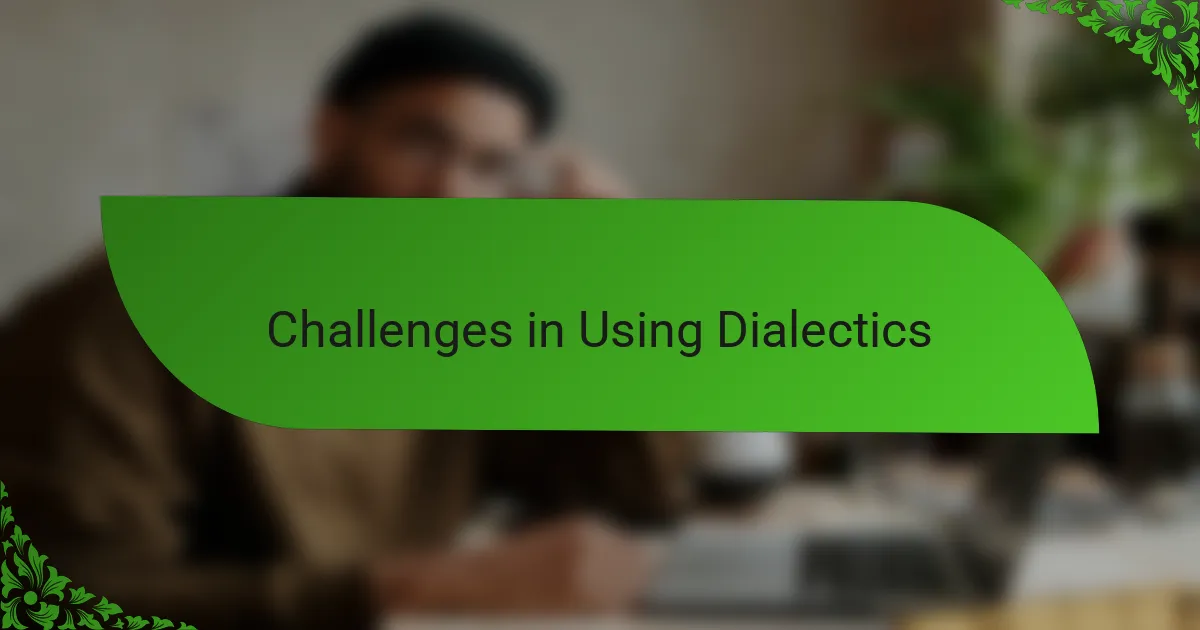
Challenges in Using Dialectics
I have to admit, one of the biggest challenges in using dialectics is resisting the urge to rush toward neat solutions. Dialectical thinking demands patience with ambiguity and contradiction, which can feel uncomfortable when we’re used to clear-cut answers. Have you ever caught yourself wanting to resolve all tensions immediately? That impatience can actually block the very synthesis dialectics seeks to reveal.
Another difficulty lies in balancing openness to opposing ideas with critical judgment. It’s tempting either to dismiss conflicting viewpoints too quickly or to accept all contradictions as equally valid without discrimination. From my experience, finding this balance takes ongoing reflection and a willingness to sit with uncertainty—an unsettling but ultimately rewarding space.
Sometimes, I’ve noticed that dialectics challenges our deeply ingrained habits of binary thinking. When I first tried applying it, I found myself slipping back into “either-or” mentalities despite knowing better. It made me realize that dialectics is not just a method but a practice requiring constant self-awareness and effort to cultivate genuine dialogue with contradictions. Have you experienced that tension between old thought patterns and new ways of thinking? It’s a subtle but profound challenge worth embracing.
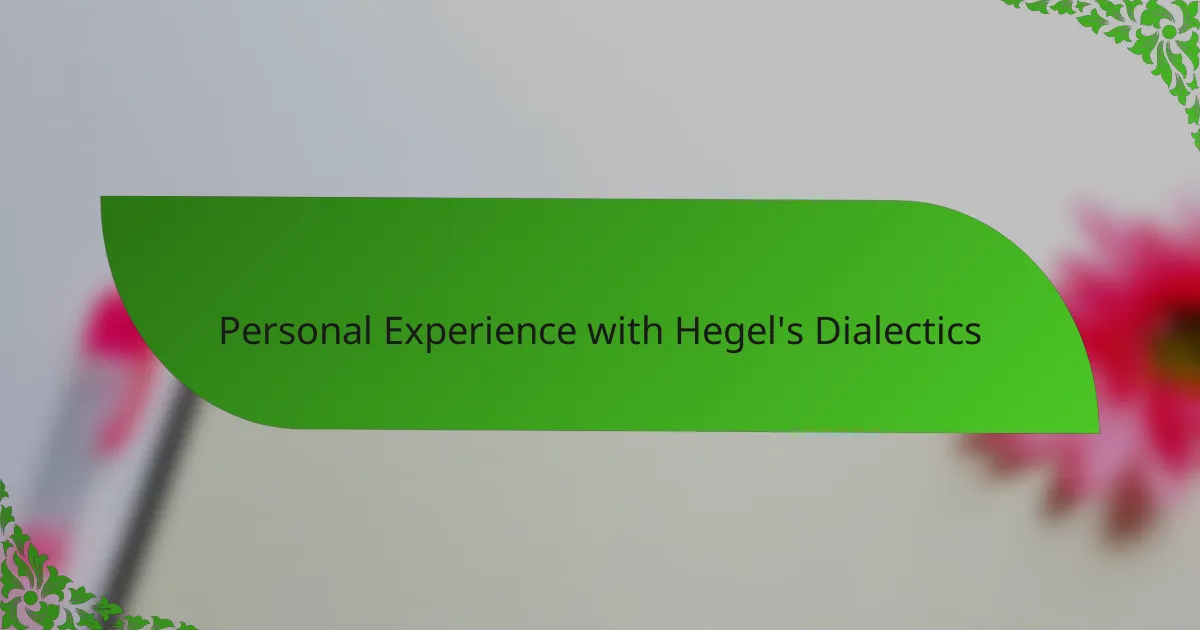
Personal Experience with Hegel’s Dialectics
Using Hegel’s dialectics in my own thinking has been like learning to dance with contradiction rather than stepping around it. I recall a time when two seemingly opposing ideas about a project’s direction clashed in my mind, and instead of forcing a quick choice, I let the tension simmer. That patience led me to a third, unexpected solution that truly felt authentic.
There was also a moment when I applied dialectics to a personal dilemma about whether to prioritize stability or adventure in my career. By holding both desires together, I found a way to honor each without sacrificing one for the other. It wasn’t easy—sometimes I got frustrated with the uncertainty—but the process helped me appreciate complexity rather than reduce it.
Have you ever felt stuck in a debate or decision, anxious to find a clear answer? In my experience, embracing that discomfort as Hegel suggests opens space for growth and new understanding. Dialectics taught me that synthesis isn’t about erasing differences but weaving them into a richer whole.
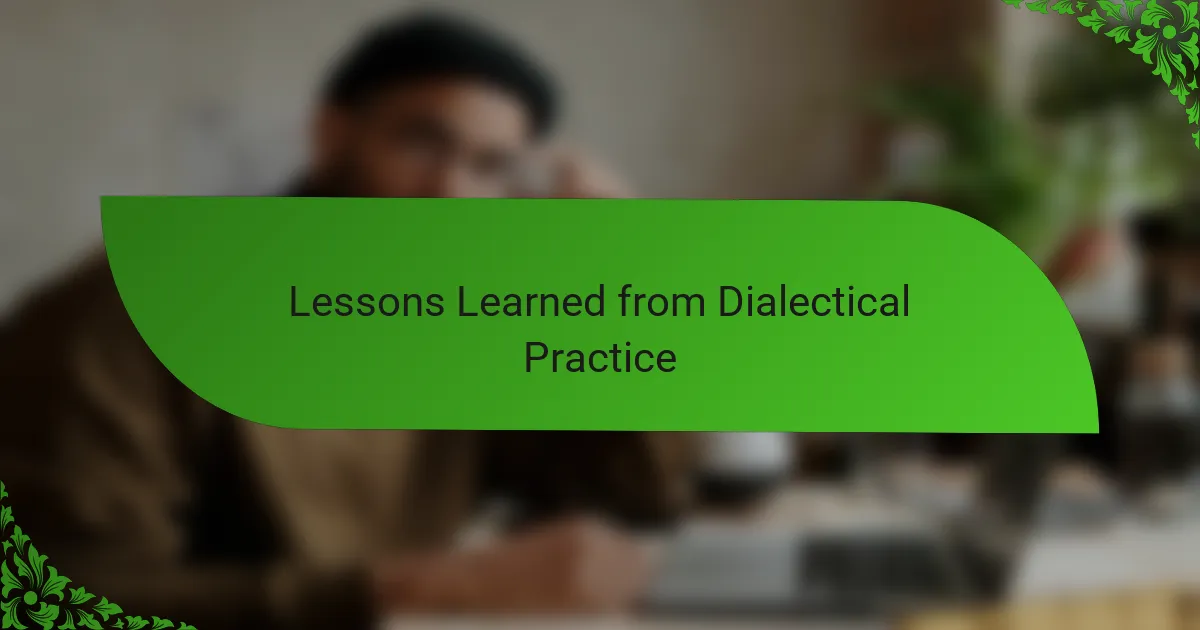
Lessons Learned from Dialectical Practice
Embracing dialectical practice taught me patience in the face of unresolved tensions. Instead of rushing to close contradictions, I learned to sit with discomfort, realizing that true understanding often unfolds slowly. Have you ever noticed how the most meaningful breakthroughs happen after lingering in uncertainty rather than escaping it?
Another lesson I cherish is the value of holding opposing ideas together without forcing them into tidy categories. Dialectics showed me that contradictions are not problems to fix but invitations to deeper insight. When I stop trying to pick sides, I find richer perspectives emerging naturally—doesn’t that shift how you approach conflict as well?
Perhaps the most profound insight came from seeing synthesis as a creative act rather than a final answer. In practice, it’s messy and ongoing, much like life itself. By welcoming this fluid process, I discovered that growth comes not from eliminating difference but from weaving diverse threads into a more nuanced whole. Have you experienced how embracing complexity can transform frustration into possibility?